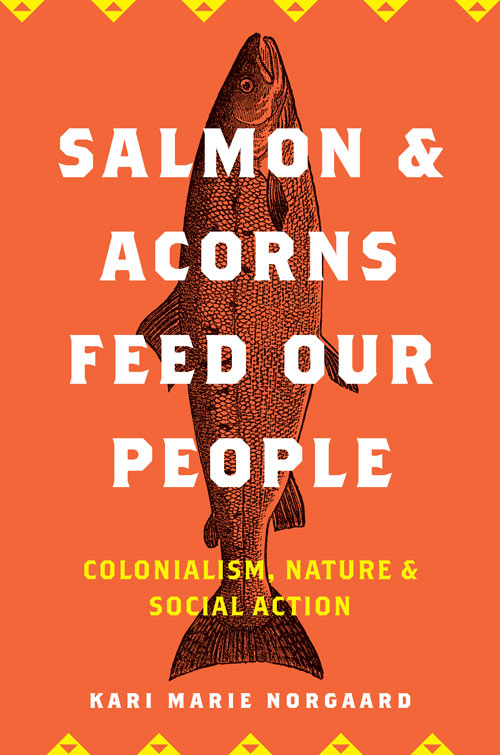
Salmon and Acorns Feed Our People: Colonialism, Nature and Social Action
Since time before memory, large numbers of salmon have made their way up and down the Klamath River. Indigenous management enabled the ecological abundance that formed the basis of capitalist wealth across North America. These activities on the landscape continue today, although they are often the site of intense political struggle. Not only has the magnitude of Native American genocide been of remarkable little sociological focus, the fact that this genocide has been coupled with a reorganization of the natural world represents a substantial theoretical void. Whereas much attention has (rightfully) focused on the structuring of capitalism, racism and patriarchy, few sociologists have attended to the ongoing process of North American colonialism. Salmon and Acorns Feed Our People draws upon nearly two decades of examples and insight from Karuk experiences on the Klamath River to illustrate how the ecological dynamics of settler-colonialism are essential for theorizing gender, race and social power today.
For a 30% discount and free shipping, enter this code on the Rutgers site at checkout: 02AAAA17
"Salmon and Acorns Feed Our People is a wake-up call for social scientists. Through an intensive analysis of Karuk experiences, Professor Norgaard shows the artificiality of nature-social divide. With passion and commitment, she demonstrates the interconnectedness of all systems (environment, health, gender, race, emotions, and political power). I highly recommend this book."
-Eduardo Bonilla-Silva, Duke University, Past-president, American Sociological Association
"Transformative for environmental justice! So many powerful relationships have created a lasting, generous and complex book, connecting ecology, culture, food, history and self-determination. Cutting in her critique of colonial power, Norgaard shows powerfully what sociology and ally-ship can achieve when responsibility and accountability are centered."
-Kyle Powys Whyte, Professor and Timnick Chair, Michigan State University
"Salmon and Acorns Feed Our People is a terrific book that impressively brings together seemingly far-flung concepts in thoughtful ways. Norgaard makes an insightful argument about how 'nature' functions within race-making, weaving sociological theories into an interdisciplinary project that is also empirically driven. My congratulations to the author on a fantastic contribution to sociology."
-Lisa Sun-Hee Park, author of The Slums of Aspen: Immigrants vs. the Environment in America’s Eden
"What a gift! Kari Norgaard’s Salmon and Acorns Feed our People illustrates in unflinching detail how the environmental degradation wrought by settler colonization must be seen as a form of violence while simultaneously revealing the Karuk’s complex knowledge and life-affirming worldview. Given the environmental crisis and our refusal to acknowledge the ballast of empire, this book is required reading."
-Laura Pulido, co-author of A People's Guide to Los Angeles
"Norgaard provide us with a powerful example of sociological research that centers the needs and priorities of Indigenous communities; the rich collaborative analyses support Indigenous resistance to colonialism."
-Michelle M. Jacob, author of Yakama Rising: Indigenous Cultural Revitalization, Activism, and Healing
"Kari Norgaard has produced a truly insightful and urgent analysis of how indigenous peoples resist racial formation and settler-colonialism, while practicing environmental justice and food sovereignty. This book is an extraordinary intervention and charts an urgently needed and timely path forward for the environmental social sciences and racial/ethnic studies."
-David Naguib Pellow, author of What is Critical Environmental Justice?
and Dehlsen Chair of Environmental Studies, UC Santa Cruz
“Colonialism, Capitalism and Karuk Land” Interview on This is Hell! podcast, January 23, 2020
Calvosa Olson, Sara. “Salmon and Acorns Feed our People: Colonialism, Nature, and Social Action” News for Native California, Fall/Winter 2019
Zeringue, Marshal.“Page 99 Test of Salmon and Acorns Feed Our People” The Page 99 Test, October 26, 2019
Norgaard, Kari Marie. “Colonization, Fire Suppression and Indigenous Resurgence in the Face of Climate Change” YES Magazine, October 22, 2019
Norgaard, Kari Marie. “Nature, Culture and the Production of Race” Section Culture: Newsletter of the ASA Culture Section, Summer 2019
Norgaard, Kari Marie. “Making Space for Indigenous Sociology Within the Discipline” ASA Footnotes, September-October 2018